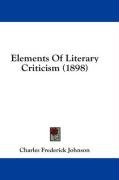elements of literary criticism

Purchase of this book includes free trial access to www.million-books.com where you can read more than a million books for free. This is an OCR edition with typos. Excerpt from book: CHAPTER IV The Writer's Philosophy. A Man is continually receiving impressions and reacting on them. He receives impressions from inanimate nature, from living things, and from books. The reaction is modified by numerous postulates and axioms, principles that he unconsciously takes for granted. Some of these principles have been born with himthey belong to the race or family of which he is a member; others he has acquired from experience and education. They weaken and limit or reinforce each other in countless ways. Among them are love of truth, love of beauty, regard for the opinions of others, regard for personal comfort, loyalty to humanity at large, loyalty to the nation, and many other primary impulses which appear in many different forms and make up a complex of tendencies which color all judgments and criticisms of life. For want of a better term we may term this complex of tendencies, so far as it influences a man's writings, the writer's philosophy. As far as it influences a man's conduct we call it his character;but a man with a pen in his hand, expressing his impressions of the world and of men, is in many ways so different from the same man in contact with the real world that we are justified in using the two terms. As a rule, the ethical standard of the writer is higher than that which he aims to reach in practical life. Francis Bacon is often named as an example of this inequality. But in many cases the rule does not hold good, and the writer is better than his books would lead us to suppose he (or she) is. Another view may make more clear what is meant by "the writer's philosophy." An artistic production is a compromise between two influences or between two views of life. One of these is the world as the writer sees it, and the other the world as he thinks... --This text refers to the Paperback edition.
Info about the book
Author:
Series:
Unknown
ISBN:
0543907317
Rating:
5/5 (2)Your rating:
0/5
Languge:
English
Users who have this book
Users who want this book
What readers are saying
What do you think? Write your own comment on this book!
write a commentif you like elements of literary criticism try:
Do you want to exchange books? It’s EASY!
Get registered and find other users who want to give their favourite books to good hands!



